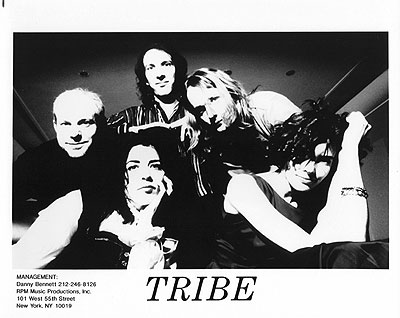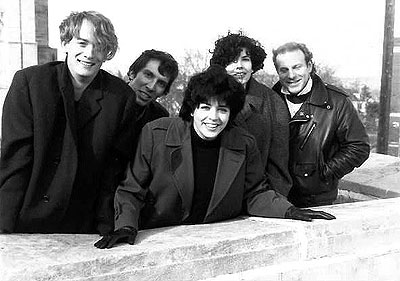Here At The Home: Remembering Tribe
Published on November 5th, 2012 in: Music, Retrovirus, We Miss The Nineties |
Photo from Tribe Online
An excerpt from my diary, circa seventh grade: “Listening to Tribe makes me feel like I’m drinking wine at a party with my parents, wearing a velvet dress.” Ah, the purple prose of preadolescence. Scratch the surface of my attempts at poetic music criticism, though, and you’ll find a grain of truth.
During their decade-long tenure, the Boston quintet created music that was both festive and formal. Their first local hit, the provocatively-titled “Abort,” was propelled by a galloping rhythm and built to an irresistibly shuddering crescendo that would be welcome at any house party. Their debut LP Here at the Home sounded like a treasure chest of lush melodies, gilded with sepulchral organ parts and choirs of background vocals. The band’s tight arrangements and singer Janet Lavalley’s wine-dark croon sounded heady and intoxicating, but the traditional song structures and melodies had a sense of sonic safety for a young listener. My tastes might never mature enough for more discordant sounds of the avant-garde, but at that time, Tribe was almost more subversive. Like the truths you’d heard at a party when you were up past your bedtime.
In the autumn of 1989, Tribe seemed to burst fully formed from the alternative radio godhead WFNX. Three songs from Here at the Home graced the station’s regular playlist, rubbing frets with such alternative heroes as The Cure and Siouxsie and the Banshees. However, their ubiquity on the airwaves and at radio station parties was the result of five years’ worth of work. “It was a lengthy, organic process,” bassist Greg LoPiccolo noted in a recent interview. LoPiccolo and a friend ran ads in the Boston Phoenix to recruit players, “until a year, year and a half, the lineup finally gelled. We were (then) a six-piece with this guy Mike, but then he quit, and we had the lineup for the band.”
At this point, the five members of Tribe lived together in a house in Lower Allston, where they’d retrofitted their basement into an ersatz recording studio. “We’d come home from work and go down there and figure out how to do it,” LoPiccolo recalled. One of their earliest recordings was “Abort,” which would become a massive hit, first on ‘FNX and eventually on their harder rocking rivals WBCN and WAAF. Eric Brosius, the band’s lead guitarist, looked back on the song’s reception. “At that time, (‘Abort’ A-side) ‘Waited For’ was the big song that people liked . . . (WFNX DJ) Bill Abbott said ‘I got your tape and I really love this song.’ We all thought it was going to be (‘Waited For’), and he said ‘No, it’s this song ‘Abort’ that I love.’ (And we said) ‘Really?'”
“Abort”‘s eventual ubiquity on the airwaves helped Tribe find a wider audience. “We were one of those bands where you had to stretch to see the goodness in us,” Brosius recalls. “After (‘Abort’), we’d start getting these strange faces we didn’t know (at shows). I think some people walked away disappointed because they had a picture of what our band sounded like that at that time . . . (which) was kind of an outlier for us.”
Eventually Tribe came together. Their sleek, keyboard-driven sound had a European quality that contrasted with the garage bands that put Boston on the map. In Janet Lavalley—a chanteuse with a dramatic contralto and a look that evoked both Sherilyn Fenn and Siouxsie Sioux—they had a strong focal point onstage, as well. (Lavalley won the Boston Phoenix Best Music Poll in 1990 and 1991, and the back pages of the special Best Music Poll section were lined with mash notes for the seductive singer.)

Photo from Tribe Online
After they self-released Here at the Home, Tribe went on tour with The Psychedelic Furs and played a smashing set at a WBCN-sponsored show at Boston Garden. “We were well-rehearsed for that tour. We were at the top of our game,” LoPiccolo noted. Brosius chimed in, “There had been some points on other tours that were as much travelling as they were playing. This was one of the tours where we played for several weeks in a row, five or six nights a week. I remember that as a time when we actually got better, immediately, because we were actually playing out every night. All our inhibitions…we didn’t really care. We knew we were going to be playing the same thing tomorrow. We became looser in attitude but tighter as a band.”
Though the band placed second in the 1988 Rumble and had a passionate fanbase in New England, the majors took a few years to catch on. After a brief bidding war, Tribe eventually signed with the legendary Warner Brothers imprint Slash. Their album Abort came out in the fall of 1991, at a time when disillusionment with hair metal and prefab dance pop was coming to a head. Alternative rock—as it was then known—was about to take a great leap forward, and audiences were clamoring for that one perfect band.
Sadly, Tribe was not that band. A trio of flannel-clad garage rockers from Seattle would eventually usher in a new era of rock. Many of Tribe’s contemporaries, like Nine Inch Nails and Think Tree, complained that Nirvana’s success made keyboard-driven bands passé. “Or a girl singer,” LoPiccolo added. When the members of Tribe completed the promotional cycle for Abort, the album had done fairly well. Their first music video was broadcast on 120 Minutes, and “Joyride” placed third on ‘FNX’s Top 101 of 1991. However, their beguiling sound didn’t find a huge audience outside of the East Coast.
Though their sophisticated sound ran counter to the prevailing trends, Tribe had the opportunity to release a second major-label album. At the outset, Sleeper‘s crowd-pleasing tracks and production by former Roxy Music bassist John Porter seemed like another in a line of should-have-been-hits for Tribe. However, Porter’s murky production, half-hearted filler songs, and intra-band tension capsized what should have been a stronger effort. The band soldered on through the mid-1990s. While they drew on traditional promotional avenues—like another music video and an appearance on Late Night with Conan O’Brien—they got their most surprising boost from scientists at CERN, who fell in love with “Supercollider,” a song about the Higgs Bosun.
Unfortunately, the physicist bump wasn’t big enough to sustain album sales, or to stave off real life. While recording demos for a potential fourth album, Tribe got the news that Warner Brothers had dropped them. In light of band members’ day jobs and other commitments, they called it a day with a poignant, cathartic co-headlining set at the Orpheum.
Unlike many of their peers on the Boston rock scene, the former members of Tribe have kept a relatively low profile. Janet Lavalley’s burgeoning solo career came to a halt when her record label shelved her album Extraordinary Popular Delusions (And the Madness of Crowds). Brosius and LoPiccolo, meanwhile, have taken on important behind-the-scenes roles creating and developing video games, among them the blockbuster Rock Band series for Harmonix. (The Tribe song “Outside” appears in the 2007 edition of Rock Band.) Former singer/keyboardist Terri Barous has also joined the video game ranks, both as a writer and a voice talent.
Two decades have elapsed since Tribe’s breakup, but their records still hold a special place in music fans’ collections. Steve Latham’s website for the band features everything they ever recorded, and in the fan forum one music-industry insider claims that even Lady Gaga has fallen in love with their music.

Greg LoPiccolo and Eric Brosius
While the promoters who organize Hot Stove Cool Music had approached the former members of the band about reuniting for a benefit show, LoPiccolo was quick to cool off the potential interest. “We’re not philosophically opposed to the idea,” he said, before noting the members’ family and job-related responsibilities. “It would have to be a good, non-lame reunion, which would require a level of work and commitment that none of us is capable of at present . . . Just reconstituting the arrangements and getting everyone’s instrumental and vocal chops together would be an incredible amount of work, which isn’t likely to happen anytime soon.”
Today, Brosius and LoPiccolo have thriving professional lives and happy families—a far cry from the hand-to-mouth existence in the waning years of Tribe. How do they feel about the ongoing interest in this band? “(We wrote) a set of songs that really meant something to a lot of people,” LoPiccolo stated. “I bump into people or I see people online or whatever who say ‘I played the hell out of that record’ or ‘I still pull that record out and listen to it’ . . . It’s kind of cool to have done something that had some kind of impact.”
2 Responses to “Here At The Home: Remembering Tribe”
November 14th, 2012 at 11:13 am
Good article, overall, and brought back some good memories. I always loved this band, and still listen to them. I’d argue that Sleeper, though, is highly underrated. What you refer to as “filler” I refer to as “deep cuts”. I really enjoy the direction they were headed with Sleeper, and after downloading demo material that is graciously made available on Steve Latham’s website (www.tribeonline.info), you can really appreciate the growth the band was making–tensions or not (sometimes tension within a band yields new and impressive material). Also, I believe Eric currently plays in a new Boston band called Eddie Japan–I’ve heard them on Boston Emissions–they sound nothing like Tribe, but really cool, nonetheless. Greg’s brother, Bart, is also in this band.
September 12th, 2015 at 9:25 am
Great article. I was mesmerized too, though I wasn’t an adolescent at the time.
A couple decades later. Where are they now?
I see that Janet LaValley has surfaced with a new, completely updated website and FB page. http://www.janetlavalley.com same address as the former Steve Latham site but all new.
Time limit is exhausted. Please reload the CAPTCHA.